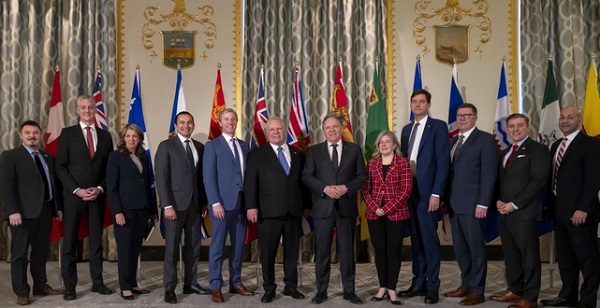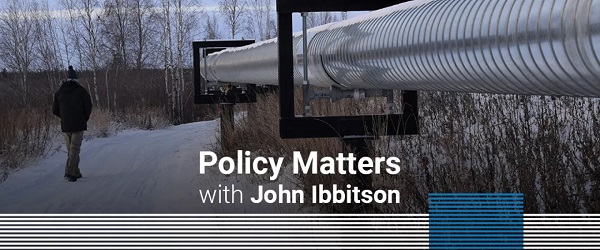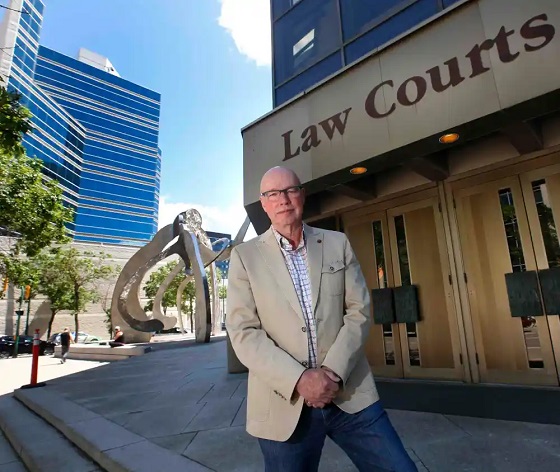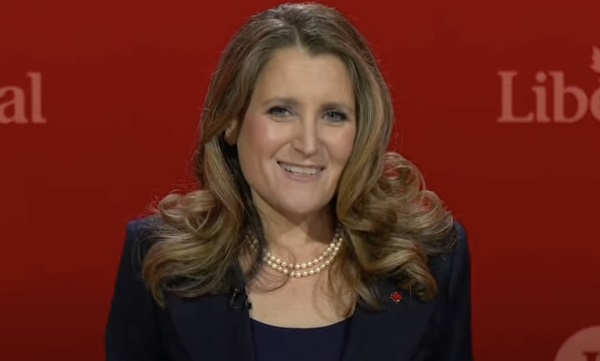Energy
Canada’s Climate Fetish Could Decimate Key Industry For First Nations

 From the Daily Caller News Foundation
From the Daily Caller News Foundation
Obsessed with the faux climate crisis, the Canadian government in Ottawa seemingly discounts altogether the social and economic benefits of natural gas to First Nations communities of the country’s western region.
Approximately 5% of the world’s gas comes from Canada, mainly from the vast Western Canadian Sedimentary Basin underlying several provinces, including British Columbia, Alberta and Saskatchewan. In 2023, the country ranked fifth in global production behind the U.S., Russia, Iran and China.
Some First Nations communities — a designation that takes in indigenous people living south of the Arctic Circlehave — historically faced challenges in terms of economic development and social well-being. Limited access to education, healthcare and infrastructure has resulted in lower living standards compared to the national averagea — fact that I observed firsthand as a researcher in British Columbia. Unemployment rates are often higher in First Nations communities, and poverty remains a persistent issue.
However, oil and gas development has provided a pathway to prosperity for many of these communities. Liquified natural gas (LNG) projects, for example, require a significant workforce in both construction and operational phases. This translates into direct employment opportunities and much needed income for First Nations people otherwise lacking financial security.
The development of natural gas resources also necessitates infrastructure upgrades in nearby communities. These can include the construction or enhancements of roads, bridges and communication networks. Such improvements benefit the entire community by providing access to markets, educational opportunities and other essential services.
“For far too long, First Nations could only watch as others built generational wealth from the resources of our traditional lands” says Eva Clayton, president of the Nisga’a Lisims government. “But times are changing.”
First Nations participation in natural gas development goes beyond economic benefits. It represents an opportunity for communities to assert their self-determination and participate in shaping their own future. Communities can participate in natural gas projects through equity ownership and various arrangements, including Impact Benefit Agreements. According to the Canada Energy Centre, more than 75 First Nations and Métis communities in Alberta and British Columbia have agreed to ownership stakes in energy projects, including the Coastal GasLink pipeline and major transportation networks for oil sands production.
One such example is the recent Musqueam Partnership agreement by FortisBC, which will share the benefits of the Tilbury LNG facility’s expansion phase to begin in 2025. First Nations beneficiaries will include communities of the Snuneymuxw, T’Sou-ke, Esquimalt, Scia’new, Pacheedaht, Pauquachin, Huu-ay-aht, Kyuquot/Checleseht, Toquaht, Uchucklesaht and Ucluelet. Similarly, the Woodfibre LNG project to begin production in 2027 will directly benefit the Squamish community.
DemandObsessed with the faux climate crisis, the Canadian government in Ottawa seemingly discounts altogether the social and economic benefits of natural gas to First Nations communities for natural gas in North America and across the world should ensure increasing prosperity into the future, unless the federal government’s climate fetish undermines the industry.
Just such a possibility has prompted an alarm to be sounded by the First Nations LNG Alliance—a collective of communities supportive of LNG development in British Columbia.
“First Nations have made their choice about the LNG opportunity, informed by research and consultation,” says Karen Ogen, CEO of the LNG Alliance.
“However, when 88 environmental groups and other organizations recently demanded an end to LNG, no one bothered to talk to us,” she said. “I view that as a ‘re-colonization’ of energy by environmentalists. It’s a type of eco-colonialism that First Nations people like me are all-too familiar with, particularly as we seek to diversify our economies and provide opportunities for young people and future generations.”
Ms. Ogen’s complaint of “eco-colonialism” is not unlike the charge of “climate imperialism” that has been leveled against Western elites by leaders of the Global South who bristle at being pressured to adopt “green” agendas at the expense of actual economic development supported gas and other fossil fuels.
Indeed, the sentiments of Ms. Ogen almost certainly resonate with those who favor common sense over ideology. “Canadian LNG is Indigenous LNG, and that is good for the world and good for all of us here,” she says.
Vijay Jayaraj is a Research Associate at the CO2 Coalition, Arlington, Virginia. He holds a master’s degree in environmental sciences from the University of East Anglia, U.K.
Business
Premiers Rally For Energy Infrastructure To Counter U.S. Tariff Threats

From the Frontier Centre for Public Policy
With U.S. tariffs looming, Premiers push for border security, pipelines, and interprovincial trade reform
After more than eight years of federal policies that have challenged the oil and gas industry, imagining Canadian energy policy in a post-Trudeau era is no easy task.
However, recent meetings addressing the threat of United States tariffs may offer hope for revisiting energy policies through provincial collaboration.
The January 2025 Council of the Federation meetings, attended by all 13 provincial and territorial premiers, produced several key value propositions.
- After spending a week in Washington, D.C., meeting with Donald Trump and his administration, Alberta Premier Danielle Smith highlighted the provinces’ resource strengths.
- British Columbia can leverage germanium—a critical mineral essential in defence applications that China will no longer export to the U.S.
- Saskatchewan’s uranium supply offers an alternative to reliance on Kazakhstan and Russia.
- Canadian provinces can provide resources that align with U.S. energy goals.
Any provincial initiatives must also address U.S. priorities, including tighter border security and increased defence spending.
To meet U.S. energy security needs, Canada must remove policy barriers hindering development. Policies like the Clean Energy Regulations (CER), the emissions cap, and the net-zero vehicle mandate (starting January 2026) are significant challenges. Provinces must collaborate to amend or remove these policies, ensuring they do not survive the next federal election. Alberta and Saskatchewan have already opposed the CER, and the proposed emissions cap remains under review.
The federal government acknowledges that these policies must be re-evaluated to avoid obstructing shared energy goals, including:
- carbon pollution pricing
- methane regulations
- clean fuel standards
- carbon capture incentives
- emissions reduction funding
- clean growth programs
- best-in-class guidelines for new oil and gas projects under federal review.
The U.S.’s energy deficit—20 million barrels consumed daily versus 13 million produced—creates an opportunity for Canada. Achieving this requires dismantling interprovincial trade barriers and developing infrastructure projects from coast to coast. The Council meetings have initiated such collaboration, with ongoing bilateral discussions expected. Infrastructure projects like pipelines to the East and West coasts would enable Canada to supply the U.S. and other global markets, reducing reliance on hostile regimes.
Newfoundland and Labrador Premier Andrew Furey stated: “I see energy as Canada’s queen in the game of chess. We don’t need to expose our queen this early. The opposition needs to know that the queen exists, but they don’t need to know what we’re going to do with the queen.”
Saskatchewan Premier Scott Moe and Alberta Premier Danielle Smith have rejected measures that would affect Canada’s energy exports to the U.S.
“When you look at the pipeline system, how oil is actually transported into the U.S. and back into Canada,” Moe said, “it would be very difficult, and I think impossible operationally to even consider.” Manitoba Premier Wab Kinew emphasized the importance of national unity, stating that energy decisions must not fracture the country. Ontario Premier Doug Ford warned that tariffs could cost Ontario 500,000 jobs, while P.E.I. Premier Dennis King noted that tariffs could cost 25 per cent of P.E.I.’s GDP and 14,000 jobs—a catastrophic loss for the province.
The Council meetings highlighted three key priorities:
- Demonstrate Canada’s commitment to border security and meet its two per cent GDP NATO target.
- Build oil and gas pipelines east and west to diversify markets and remove interprovincial trade barriers, enabling a stronger national economy.
- Secure provincial consent before imposing export tariffs or restrictions that could harm individual provinces.
This emerging consensus underscores that Canada’s energy future depends on proactive, constructive diplomacy with U.S. lawmakers, supported by a unified provincial front and practical energy policies that benefit both nations.
Maureen McCall is an energy business analyst and Fellow at the Frontier Center for Public Policy. She writes on energy issues for EnergyNow and the BOE Report. She has 20 years of experience as a business analyst for national and international energy companies in Canada.
Economy
Here’s how First Nations can access a reliable source of revenue

From the Fraser Institute
According to Pierre Poilievre, a Conservative government would permit First Nations to directly receive tax revenues from resource development on their ancestral territories. Political leaders of all parties should commit to such direct taxation. Because time is short.
Faced with the prospect of tariffs and other hostile American actions, Canada must build new energy infrastructure, mine critical minerals and diversify trade.
First Nations participation is critical to these plans. But too often, proposed infrastructure and resource projects on their territories become mired in lengthy negotiations that benefit only bureaucrats and lawyers. The First Nations Resource Charge (FNRC), a brainchild of the First Nations Tax Commission, could help cut through some of that red tape.
Currently, First Nations, the federal government and businesses negotiate agreements through a variety of mechanisms that establish the financial, environmental and cultural terms for a proposed development. As part of any agreement, Ottawa collects tax revenue from the project, then remits a portion of that revenue to the First Nation. The process is bureaucratic, time-consuming and paternalistic.
Under one version of the proposed charge, the First Nation would directly collect a portion of the federal corporate tax from the developer. The federal government, in turn, would issue the corporation an equivalent tax credit.
In effect, Ottawa would transfer tax points to First Nations.
“The Resource Charge doesn’t mean we won’t say no to bad projects where the costs to us are too high,” said Chief Darren Blaney of B.C’s Homalco First Nation, when the Conservatives first laid out the proposal last year. “It could mean, however, that good projects happen faster. This is what we all want.”
Poilievre referenced the proposed tax transfer in his Feb. 15 rally when he vowed to remove regulatory obstacles to fast-track resource development projects.
“We will incentivize Indigenous leaders to support these projects by letting companies pay a share of their federal corporate taxes to local First Nations,” he declared. “I want the First Nations people of Canada to be the richest people in the world.”
The First Nations Tax Commission first came up with the idea. Poilievre’s federal Conservatives are the first political party to embrace it. But there’s no reason why support for resource charges could not be bipartisan.
Mark Carney, the frontrunning candidate to succeed Justin Trudeau as Liberal Leader and prime minister, has vowed to use “all of the powers of the federal government… to accelerate the major projects that we need.” Supporting the FNRC would further that goal.
That said, resistance has already emerged.
“Most Indigenous leaders would see right through (what Poilievre said) because we’ve been around that corner a few times,” Dawn Martin-Hill, professor emeritus of Indigenous Studies at McMaster University, told the Canadian Press. “Selling your soul to have what other Canadians have, which is access to clean drinking water coming out of your tap, is highly problematic.”
But Prof. Martin-Hill inadvertently makes the case for the FNRC. Municipal governments raise funds by taxing the property of individuals and businesses and using the revenue to, among other things, provide clean drinking water. A First Nation that taxed a business operating on its territory, and used the revenue to provide clean drinking water for people on reserve, would simply be doing what governments are supposed to do.
Existing agreements, though cumbersome, have brought major new revenues to some reserves. The FNRC could increase revenues and First Nations autonomy.
Given the complexities of the tax code, and the limited administrative capacity of some First Nations, some agreements might see the federal government continuing to collect taxes and then remitting the First Nation’s portion to that government. The goal would be to ensure that revenues streams are transparent, predictable and support the greatest possible autonomy for each First Nation.
Any government committed to implementing the FNRC should convene a working group of First Nations leaders, private-sector executives and government officials to work out a framework agreement.
If the Conservatives win the next election, the working group could be part of a task force on tax reform that Poilievre said he intends to establish.
The FNRC would be voluntary. Communities could opt in or opt out. Provincial governments might also participate, sharing a portion of their taxes with First Nations.
If it works, a First Nations Resource Charge could speed the approval of lumber, mining, pipelines and other resource-related projects on the traditional lands of First Nations. It could provide reserves with stable and autonomous funding.
It’s an idea worth trying, regardless of which party forms the next government.
-

 Courageous Discourse2 days ago
Courageous Discourse2 days agoZelensky Met with Dems Before He Met President Trump
-

 National1 day ago
National1 day agoMark Carney, Justin Trudeau both deeply tied to WEF, Communist China: report
-

 International2 days ago
International2 days agoDataRepublican Exposes the Shadow Government’s Darkest Secrets
-

 Economy1 day ago
Economy1 day agoHere’s how First Nations can access a reliable source of revenue
-

 conflict1 day ago
conflict1 day agoIs Ukraine War a Money-Sucking Charade?
-

 Alberta21 hours ago
Alberta21 hours agoFormer Chief Judge of Manitoba Proincial Court will lead investigation into AHS procurement process
-

 Business1 day ago
Business1 day agoTrump’s USAID shutdown is a win for America and a blow to the globalist agenda
-

 Alberta23 hours ago
Alberta23 hours agoProvince announces funding for interim cardiac catheterization lab at the Red Deer Regional Hospital





